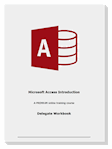Microsoft Access 2013/2016 Introduction
NEW WEBSITE DEAL: Microsoft Access 2013/2016 Introduction with FREE CPD certificate, workbook & exercises
ZandaX
Summary
Add to basket or enquire
Overview
PROFESSIONAL course option, with a ZandaX Microsoft Access 2013/2016 Introduction workbook and CPD certificate...
The price includes a comprehensive but easy-to-follow Microsoft Access 2013/2016 Introduction video course, delivered in 4 targeted modules, along with your own ZandaX Microsoft Access 2013/2016 Introduction workbook and exercises, and a personalized CPD diploma.
All Microsoft Access 2013/2016 Introduction courses are fully CPD certified.
Microsoft Access is THE application for creating desktop databases.
The ZandaX Access Introduction course shows you the basics of creating a desktop database and gives you a solid foundation on which to build your skills. You will learn how to create a new database and populate it with all the necessary elements: tables, queries, forms and reports, as well performing essential tasks like entering sorting and filtering data and printing database objects.
CPD
Course media
Resources
- Course Brochure for Microsoft Access 2013/2016 Introduction - download
Description
ABOUT THE ZANDAX WORKBOOK: You get the special ZandaX workbook which gives a course summary and space for your notes, as well as our unique ACTION PLAN that enables you to relate the content to your own life, and to monitor and manage your ongoing development. How does that sound?
Here's what you'll learn in our Microsoft Access 2013/2016 Introduction course:
Getting Started with Access* Starting Out * Interface Basics * Database Security * Getting Help
Using the Ribbon Interface
* The Quick Access Toolbar * Basics of Tabs * The Home Tab * The Create Tab * The External Data Tab * The Database Tools Tab
Creating a Simple Database
* First Steps in Database Creation * Database Records * Creating a Table * Formatting Text
Forms, Queries, Reports and Filters
* Creating and Using Forms * Creating and Using Queries * Creating and Using Reports * Sorting and Filtering Data * Viewing Data * Printing a Database Object
Who is this course for?
The course is intended for new users of Microsoft Access who want to become productive in the shortest possible time.
Requirements
You should be proficient in using a PC with the Windows operating system, but no prior experience with Access is required.
Questions and answers
Is there a tutor that can be contacted during the course?
Answer:Hi Rose We did have an option that allowed this, but we needed staff to man it so it was more expensive. and generally got lost in the cheaper offerings. So unfortunately we discontinued it. Of course, if you have any technical problems, we're here via email. Warm regards The ZandaX Team
This was helpful.
Reviews
Currently there are no reviews for this course. Be the first to leave a review.
Legal information
This course is advertised on reed.co.uk by the Course Provider, whose terms and conditions apply. Purchases are made directly from the Course Provider, and as such, content and materials are supplied by the Course Provider directly. Reed is acting as agent and not reseller in relation to this course. Reed's only responsibility is to facilitate your payment for the course. It is your responsibility to review and agree to the Course Provider's terms and conditions and satisfy yourself as to the suitability of the course you intend to purchase. Reed will not have any responsibility for the content of the course and/or associated materials.


